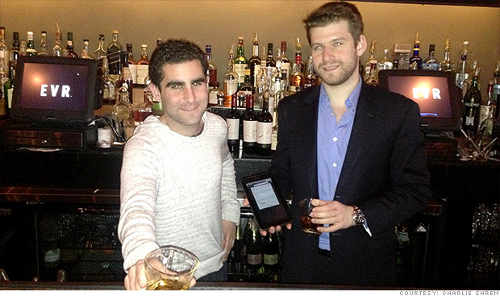- How Can You Buy Bitcoin Quickly?
- Is Bitcoin Mining, Transaction Validation Or Mining?
- Will Ripple Be Important To The Bitcoin Community?
Full Interview Audio

Personal Info
Sports Teams:NY Mets, NY Knicks, NY Giants, NY Islanders
Favourite Books:
- If On A Winter’s Night a Traveler by Italo Calvino
- Invisible Cities by Italo Calvino
Twitter: http://twitter.com/CharlieShrem
Personal Blog: http://blog.bitinstant.com
Website: http://bitinstant.com
Relevant Link: http://www.linkedin.com/in/charlieshrem
Interview Highlights
This is a condensed, lightly edited transcript of an audio interview. The full audio is available and highly recommended. The interviewee may post clarifications in the comments.
Adrian Bye: Today I’m here with Charlie Shrem who is the CEO and founder of BitInstant, which is a Bitcoin company. Charlie, thanks, and welcome to my little program. 
Charlie Shrem: Thanks for having me. I appreciate it.
Adrian Bye: Can you tell us a little bit about who you are and where you’re from?
Charlie Shrem: Sure, my name is Charlie. I’m born and raised and first incorporated in Brooklyn, New York. I started getting involved in the Bitcoin space in early 2011 when it was still fairly new. The first ever Bitcoin post by Satoshi was on November 1, 2008, but it didn’t really get any attention until somewhere around late 2009. Sometime around 2010 was when the first Bitcoin exchanges in companies started popping up, and I was one of the first startups in the Bitcoin space. Our company BitInstant allows people to buy in some Bitcoin local locations all over the world.
I’m 23, grew up in New York, went to high school here in Brooklyn, and went to Brooklyn College. In my freshman year I started a startup. My cousin came to me with a cool idea, dailycheckout.com was the name of the site, where we’d sell one product every day. This was before Groupon. We ran for about three years in college under Platinum Capital Growth. I have a degree in economics, but it’s Keynesian economics. So it’s the complete opposite of what I’m believing now, Austrian economics and Bitcoin. I guess I needed to learn the other side before I can see the light. And then, early in the fourth year of college, we got a great offer to sell Daily Checkout.
Adrian Bye: Was it a good sale?
Charlie Shrem: Yes, really good.
Adrian Bye: So you made some good money and had some time off and figure out what’s next?
Charlie Shrem: It wasn’t like crazy millions or anything, but for a twenty year old kid the money that I came into felt like I was a super millionaire. At the same time, the experience and the knowledge was just amazing. It was the best three years of my life. And then one day I was browsing on the Bitcointalk forums.
Adrian Bye: I read this. You started reading about Bitcoin and became obsessed. Did you buy Bitcoin when you started doing that?
Charlie Shrem: Yes, I became obsessed, and I started to buy some Bitcoin. It took about two weeks to buy Bitcoin at MtGox, the wire got frozen, Tradehill’s bank account got closed. It was a big hassle.
Adrian Bye: It still is. I’m trying to get into Bitcoin now. It’s probably three weeks and I’m still waiting.
Charlie Shrem: It’s ridiculous. I put all of the money I have and had into BitInstant because when I was browsing online I came up this post. I said to myself, if this thing is going to succeed there needs to be an easier way to get money in and out of this system, a lot easier. So I was browsing on the Bitcointalk forums and saw this post by this guy, Gareth Nelson, who said I have this great idea. He was calling it Fast MtGox Pay. He came up with this idea for BitInstant. I emailed him and said, here’s a thousand dollars, that’s all the money I have, let’s do this project. That is how we started BitInstant two years ago. Bitcoin was such a joke back then, it still is. If you look at what Ghandi said: first they ignore you, then they laugh at you, and then they fight you when you win. I had thought that we were at the laughing stage two years ago, but I realize that actually we were still in the ignoring stage. Now we’re in the laughing stage. We have the world’s spotlight on us. The news, the press, the media love to cover it because it’s fun, it’s interesting. But at the end of the day they really don’t understand the utility and how it works and what change it will bring to the world. Bitcoin is just raw infrastructure, and it takes whoever can really harness that and develop it into a mainstream product, which is what I’m trying to do.
Adrian Bye: Why don’t you tell us about the idea of BitInstant? You talked about it used to take two weeks to get into MtGox, which is the central Bitcoin exchange. I’ve opened up my account there and it’s still not validated probably three weeks later. BitInstant is doing something totally different. Why don’t you tell us how that works?
Charlie Shrem: There are two types of Bitcoin customers, the under 10,000 dollar customer and the over 10,000 dollar customer. For anyone who wants to buy over 10,000 dollars worth of Bitcoins you really need high-quality know-your-customer and AML policies, which is why we’re going through this crazy verification. But 80% of people buying Bitcoin don’t care to buy 1) on an exchange and 2) don’t need to go through all that rigorous KYC, the postal and all that. So I said, let’s develop a way where we are not treating every customer like a criminal. We developed a KYC program way before any Bitcoin company was doing that. What you see right now is BitInstant Version 1. We’ve never changed our site in two years. I’d say 60% of our customers are using our API and aren’t even coming to our website. Or they are using our services that are integrated into one of the App. We’ve really conquered the market share in buying low amounts of Bitcoin. Using BitInstant you can go into any Walmart, 7Eleven, CVS, Duane-Reed, Walgreens, Albertsons and buy Bitcoins. We’ve made partnerships. We are essentially using their register. You come to BitInstant.com, create an account with us. Say I want to buy four hundred dollars worth of Bitcoin. It would pull up a map, you would type in your zip code and it would find your nearest location. You print out a deposit slip, bring it to the teller, hand the cash and the slip to the teller, and that’s it.
Adrian Bye: How much Bitcoin can someone buy through BitInstant? 
Charlie Shrem: Right now we have a flat daily limit of $2000 per day, of $500 per transfer. But we do a have velocity check, so if you’re doing a limit for three days straight, then things will get frozen.
Adrian Bye: Personally, I need something simple to pay people with, and I would like starting using Bitcoin and I haven’t been able to. I need to be able to pull maybe a thousand bucks a month out in Bitcoins.
Charlie Shrem: That’s the thing. There are so many good uses of Bitcoin and great utility, but the infrastructure just isn’t there yet.
Adrian Bye: You made an interesting comment which I didn’t understand. You said: Mining is not actually mining, it’s auditing. Can you talk a little bit about that?
Charlie Shrem: Visa has their central transaction server and a data center. They pay billions of dollars a year to make it work because you need that trust. PayPal is the same thing, that’s how databases work. But with Bitcoin Satoshi said we’re going to take this database that everyone can see, everyone can read it, and instead of keeping it on a server somewhere and having all the transactions be written on that database’s central server, let’s give everyone a copy of the database. Everyone’s going to download a copy of the database. But then you need a way for all new transactions to be written into this database. The problem is that because it’s on everyone’s computer it requires a lot of computing resources to actually connect to every single one and to write to it. It’s like file sharing. it takes a lot of resources. Also don’t forget you need a way to check every single database to make sure that someone’s not taking his Bitcoins and double-spending them. Satoshi said we need to solve two problems: we need massive amounts of computing power to be able to write to all these databases in real time as transactions are happening. Not only that, we need a way to release Bitcoins, in an automated way, in a predictable scale, but not rewarding anyone for doing nothing. There needs to be a real reason for these people to get these Bitcoins. He solved that with the system of mining. Essentially, anyone can mine. Your laptop won’t really do much because the amount of Bitcoins that you’ll be getting is the computing power of your computer relative to the whole network. So if your computer is 1% of the whole network, you will get 1% of the new Bitcoins that come into it. Every ten or fifteen minutes the block chain takes all the transactions that happen in those fifteen minutes, wraps it up into a block and puts it into the mining pools for auditing. And then all the miners try to solve this really, really hard math problem. That takes a long time, fifteen, twenty minutes. While they are doing that they’re taking all these transactions and broadcasting it to the whole network. Once it’s written in and confirmed, the block becomes confirmed. And then, whoever “found” the block, whichever miner actually gets the Bitcoins.
Adrian Bye: One of the ideas that is being proposed is a currency. Let’s say Bitcoin breaks and we could have a currency without mining. Even with Bitcoin as it is now, mining will become redundant because we will have mined the whole thing. How does that all work? How does all that fit together? 
Charlie Shrem: I think there are two questions. I want to answer the second one first. Mining will not become redundant. What happens is once there is no incentive for new coins to be mined, miners need to make money in another way because transactions still need to be audited. And it’s very important that they do. These guys are like the soldiers for Bitcoin. All Bitcoin transactions are free but you have the opportunity to put a transaction fee on to it. By doing so miners are incentivized to take your transaction and audit it first. If you attach even a few cents your transaction could be put into the next block. If you don’t attach a transaction fee, it could take a day or two for it to have one confirmation. If I’m selling a car or a house I want it to be confirmed as fast as possible. So I’m going to add ten or fifteen bucks and then a miner will want to put it in. The hope is that as the reward for Bitcoin gets smaller and smaller every four years, it went from 50 Bitcoins to 25 Bitcoins and then to 12 and a half, that by the time it reaches the zero point, the size of the Bitcoin economy itself will be big enough where people want to put transaction fees. 25 Bitcoins in a block is nothing. And that will overtake it. Satoshi thought of all of these things. He knew that mining will become redundant, and you would still need to incentivize miners. We’re seeing it already. People are attaching transaction fees. If you’re trying to withdraw Bitcoins from MtGox and you don’t click ‘add transaction fee’, there is a warning message ‘Are you sure you want to send this transaction without adding a fee to it? It may take a few days for it to get confirmed’.
And then the first thing you asked: I think Bitcoin is three things. Bitcoin is a currency and it’s a payment system. And more importantly, it’s a protocol. It’s a system.
Adrian Bye: It’s a platform.
Charlie Shrem: Exactly, a platform. VoIP and HTTP are exactly like Bitcoin. But VoIP is a protocol that billions of people rely on every day that’s never been hacked. For the same reason Bitcoin’s never been hacked. It’s Open Source, it’s worldwide, anyone can be involved in it. At the same time, the idea of a virtual payment system and a currency that’s not controlled, issued or regulated by any state, government or corporation is what really makes Bitcoin worth billions of dollars. Bitcoin as we see it now may in fact fail. Bitcoin is flawed. There is a problem with it and it could fail. But then you’ll have Bitcoin 2.0, you have Namecoin, or Lightcoin, or Ripple. I love the ripple guys and I love the concept even though I don’t fully understand it. I’ve seen Bitcoin like the largest socio-economic experiment the world has ever seen. You’re taking all these people around the world who before Bitcoin had no interest in each other, no common goal, nothing, and now we’re taking all of these millions of people today that are all involved in this experiment together.
Adrian Bye: Ripple to me is very interesting. The web is essentially a peer-to-peer system. On top of that is this concept of a distributed trust network. This is where Google uses backlinks where sites can link to other sites. That was a profound innovation when Google came along. Facebook is the same. It’s a peer-to-peer and then it’s a distributed trust network on top of that. Ripple is the same concept in the Bitcoin world. Bitcoin is the peer-to-peer platform, and then Ripple is a distributed trust network built on top of that. The concept of Ripple is that we have to effectively rate all our friends and say how much we are willing to extend credit to them. That sounds horribly annoying. I was initially very negative on it, but then seeing that it works on the same concept that applied for Google and Facebook, this peer-to-peer with distributed trust network on top says to me that maybe there is something in Ripple. I’m curious as to your thoughts.
Charlie Shrem: I agree totally. I really felt the same way for a long time. I was not a fan of Ripple whatsoever. Fast forward now, Chris Larsson and his team are unbelievable people. The whole concept is just truly genius. How he applied it to money I think is just novel and should work. Ripple gives the ability for lending in Bitcoin. Banks are allowed to lend a certain amount of money based on how much they have, and that is how money is put into circulation. With Bitcoin it’s very different. Money is put into circulation in a different way. There is not much of an incentive to lend because you have to lend with money that you have, not with made up money like banks are allowed to do. Ripple gives the ability to lend people money without having to trust someone who walks in your door just randomly because Bitcoin is irreversible. If you lend somebody money there is just so much you can do to get that back. With Ripple there is this trust network setup. I don’t really like it, but I think it’s too early to tell. It needs a lot more adoption and everything to see. But the main point is that Ripple is not a competitor to Bitcoin.
Adrian Bye: It’s an additional layer.
Charlie Shrem: Exactly, it’s extremely complimentary.
Adrian Bye: Distributed trust network is an important concept on the internet and so it wouldn’t surprise me if what they end up doing works.
Charlie Shrem: Yes I think it could be a cool infrastructure for banks to use.
Adrian Bye: Great. Charlie, thank you very much for your time.
Charlie Shrem: Thank you.









